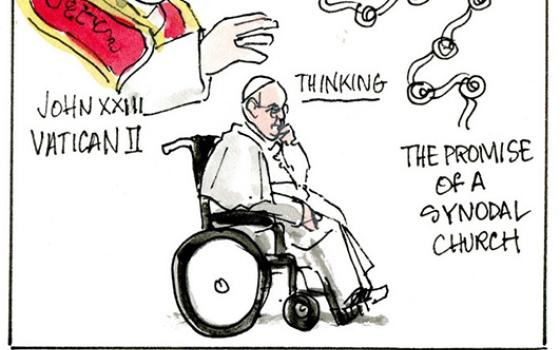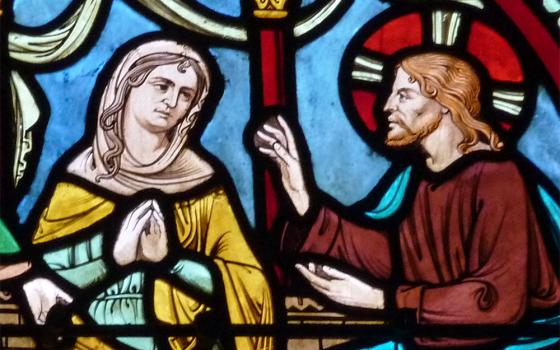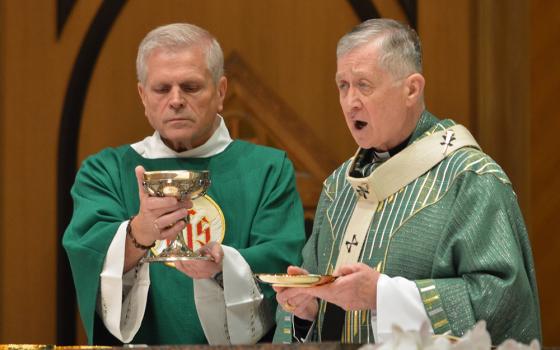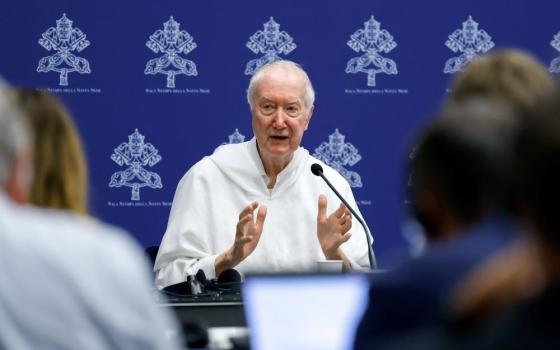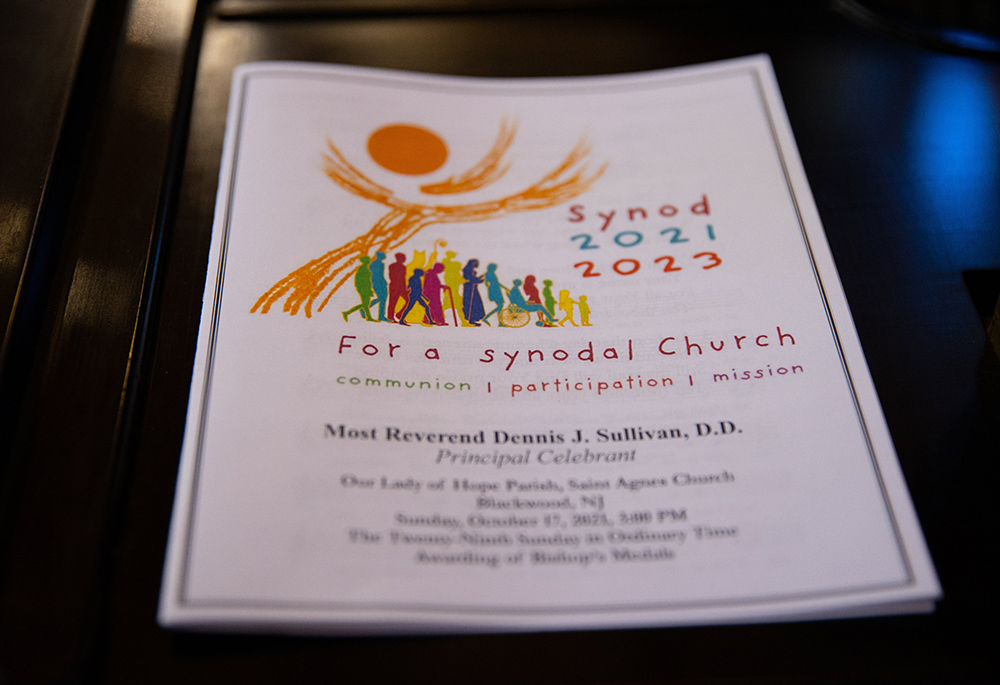
A program for a Mass opening the synod process in the Diocese of Camden, New Jersey, is seen at St. Agnes Church of Our Lady of Hope Parish Oct. 17, 2021, in Blackwood. Over several months reflections were collected from the faithful in parishes across the diocese and put before diocesan teams and deaneries as part of the churchwide preparation process for the 2023 world Synod of Bishops on synodality. (CNS/Catholic Star Herald/Dave Hernandez)
Clericalism cuts two ways, neither of which has been good for the church. Clerics, who believe they have all the answers and the power, tell the faithful what they can and cannot do. On the other side are laity, who nod off in the pews and leave the heavy lifting to priests and religious. The laity have never been asked to do anything but pray, pay and obey, so why bother?
That reality was sustainable, if not desirable, when there were lots of priests and religious and they were the most educated people in the parish. Today, most parts of the world have an educated laity and so few priests and religious that the church is in serious decline.
Pope Francis has made a frontal attack on clericalism, telling bishops not to act like princes and telling priests to be more pastoral. With the Synod on Synodality, he is also calling the laity to step up and take ownership in the church.
Advertisement
In this process, it is especially important that the clergy listen to the laity, but it is also important that the laity listen to each other.
The U.S. bishops' report on the work so far — officially the "National Synthesis of the People of God in the United States of America for the Diocesan Phase of the 2021-2023 Synod" — released in September, summarizes 10 months of listening sessions in American parishes and dioceses.
Last month, I detailed in my column the enduring wounds that were exposed in the listening sessions. They include "the enduring wounds caused by the clergy sexual abuse scandal, the pandemic, polarization, and marginalization have exposed a deep hunger for healing and the strong desire for communion, community, and a sense of belonging and being united."
But the listening sessions were not simply picking at old wounds. They spoke of a longing for communion and participation in the church. The laity is waking from its slumber and desires "to draw closer to God and each other through a deeper knowledge of Scripture, prayer, and sacramental celebrations, especially the Eucharist," the bishops wrote.
While there were different perspectives on what constitutes good liturgy, there was agreement on the need for "warmer hospitality, healing services, and more invigorating preaching by clergy."
According to the synthesis, "The most common desire named in the synodal consultations was to be a more welcoming Church where all members of the People of God can find accompaniment on the journey."
The participants in the sessions acknowledged the tension between walking with people while remaining faithful to the teachings of the church. Yet "for many, the perception is that the blanket application of rules and policies is used as a means of wielding power or acting as a gatekeeper."
Quoting from the account of one consultation, the bishops' synthesis said, "People noted that the Church seems to prioritize doctrine over people, rules and regulations over lived reality."
That account could have been quoting Francis when it said, "People want the Church to be a home for the wounded and broken, not an institution for the perfect. They want the Church to meet people where they are, wherever they are, and walk with them rather than judging them; to build real relationships through care and authenticity, not superiority."
Overall, the listening sessions showed no desire for a smaller, purer church. Catholics do not seem to want to exclude the wounded or sinners.
People needing to feel welcomed included, according to the synthesis, LGBTQ+ persons, who "believe they are condemned by Church teachings," and their families, who "feel torn between remaining in the church and supporting their loved ones."
Also divorced persons, "whether remarried or not, often feel unwelcome within the Church," according to the report. "The annulment process is experienced as unduly burdensome and judgmental." The divorced described "feeling like they are held to a higher standard while people who have committed other sins continue to receive communion."
Catholic people of color "spoke of routine encounters with racism, both inside and outside the Church," the synthesis reports. "Indigenous Catholics spoke of the generational trauma caused by racism and abuse in boarding schools."
The participants offered practical suggestions for creating more community across racial and ethnic lines. "Providing forums for conversations on race, immigration, and loving openness to others is critical in allowing individuals to be heard and understood," was one. Masses in different languages were mentioned, but some wondered how to share communion with all parishioners even when they celebrate separately.
"Practically all synodal consultations shared a deep ache in the wake of the departure of young people and viewed this as integrally connected to becoming a more welcoming Church," according to the report. Young people "want the Church to speak out about issues that matter to them, especially justice, race, and climate change." The young want to be seen not as the future of the church but as important now. They want to be given a significant voice in the present.
Finally, those taking part in the process felt the church needs to be more welcoming to women, suggesting "a variety of ways in which women could exercise leadership, including preaching and ordination as deacon or priest."
Participants "shared a deep appreciation for the powerful impact of women religious who have consistently led the way in carrying out the mission of the Church," the synthesis reports. "There was a desire for stronger leadership, discernment, and decision-making roles for women — both lay and religious — in their parishes and communities."
Overall, the listening sessions showed no desire for a smaller, purer church. Catholics do not seem to want to exclude the wounded or sinners. They prefer a welcoming community where all are called to communion and participation. The people appear to be in line with Francis' desire for a welcoming church that travels together along the synodal path.
None of this will be surprising to anyone familiar with survey research on the Catholic laity. What is new here is a papally endorsed process that allows the laity to surface their views in a public way.
The people are speaking. Is anyone listening?





